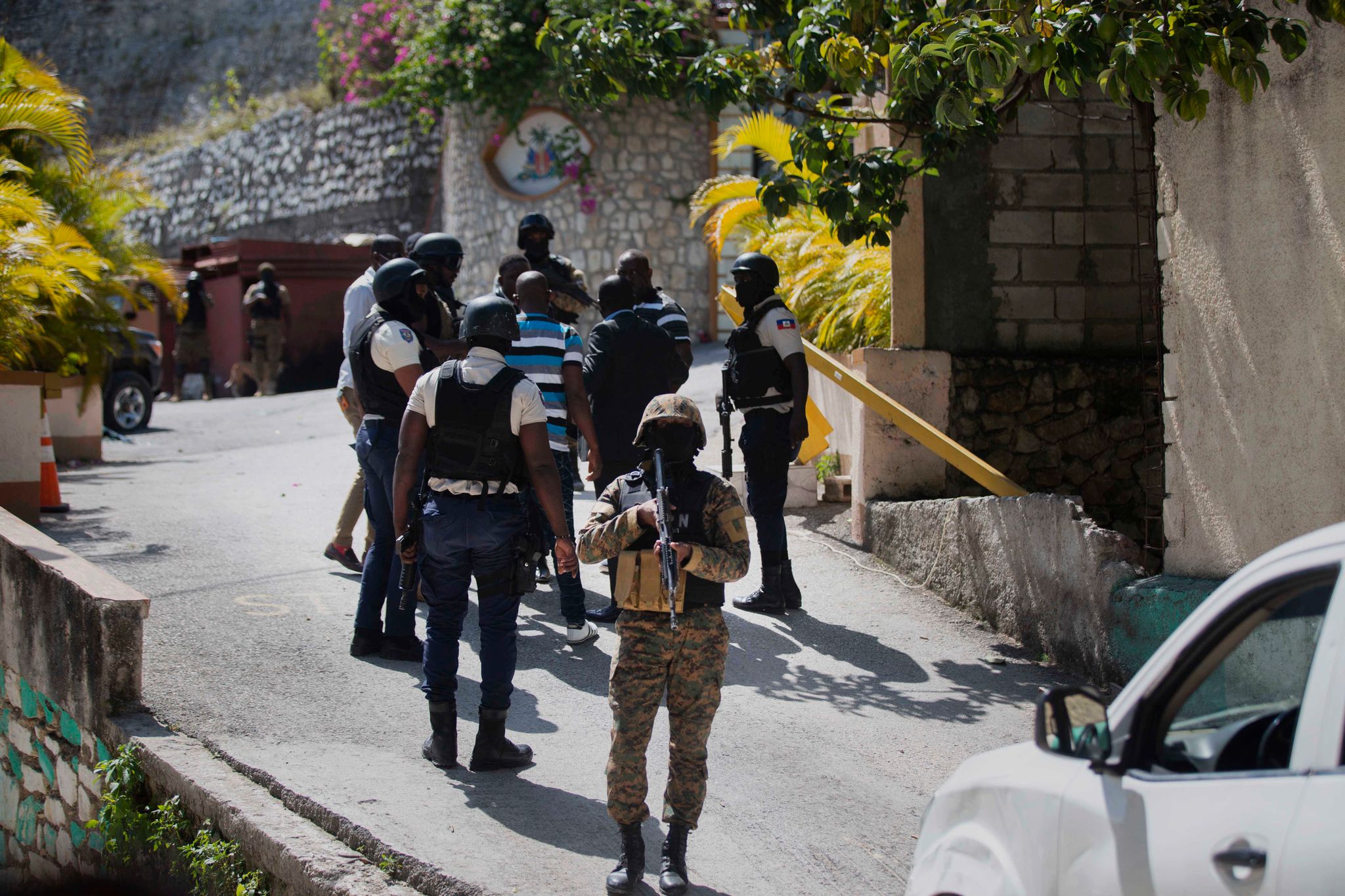Armed gangs are fighting for control of the capital, Port-au-Prince. The country is in a big corona wave. The president was killed. – It is a perfect storm, says UN chief in Haiti to Aftenposten.
Haitian security forces outside the presidential residence on Wednesday. Foto: Joseph Odelyn, AP
––
—
Armed men entered the president’s residence on Wednesday night, in the affluent neighborhood of Petion-Ville on the outskirts of Port-au-Prince.
President Jovenel Moïse was shot and killed in his own home. His wife Martine Moïse was injured but is still alive.
The attack comes at a time of growing violence in Haiti. Criminal gangs control large parts of the capital, and gain more and more power. Women and children have fled from poor areas in the capital.
The day after the attack, the streets were still quiet.
– Port-au-Prince is calm today. There are some roadblocks, some burning car tires, but people stay at home, says Unicef chief in Haiti Bruno Maes to Aftenposten.
– The assassination of the president is a tragic event for the country. This is a perfect storm. The situation is very unstable. We do not know where the country is going, he adds.
President Jovenel Moïse remained president, despite the end of his presidency in February. The country now lacks legitimate political leadership. Photo: Dieu Nalio Chery, AP
––
Pretended to be American
It is still unclear who is behind the attack.
The attack on the presidential residence took place just after 01 o’clock on Wednesday night, local time. Several videos on social media show what the perpetrators are, dressed in black and armed with automatic weapons. It is not confirmed if the videos are real.
The men are said to have pretended to be agents of the DEA, the American drug police. Haiti’s ambassador to the United States confirmed on Wednesday night that the perpetrators pretended to be American, but denies that the DEA is behind the attack.
“There is no reason to believe that this is the DEA,” Ambassador Bochhit Edmond told Reuters.
Acting Prime Minister Claude Joseph said on Wednesday that the attack was probably carried out by mercenaries.
This afternoon, the Prime Minister declared a state of emergency. The airport in the capital is closed. It is also the border with the neighboring country Dominican Republic. Local media report tense atmosphere in the capital Port-au-Prince the day after the attack.
The state of emergency shall last for 15 days.
Evacuated to Miami
The president’s wife Martine Moïse was also injured in the attack. Her condition was critical Wednesday night, according to Reuters. Authorities in Haiti are now trying to get her evacuated to Miami in the United States for medical treatment.
The Haitian newspaper Gazette Haiti writes that Martine Moïse was hit by three bullets, but that she should be out of danger.
Empty ammunition cases are outside the presidential residence on Wednesday. Foto: Joseph Odelyn, AP
––
A resident shows bullet holes in a car parked outside the presidential residence. Foto: Joseph Odelyn, AP ––
Jovenel Moïse turned 53 years old, and had little political experience before becoming president in 2017. Moïse ran several businesses in Haiti, including banana production. His presidency has been plagued by unrest. Moïse was actually elected in 2015, but was denied the presidency for two years. His term therefore actually expired in February this year, but he still holds the presidency. He dissolved parliament more than a year ago, without announcing new elections. For the past year, he has ruled the country with presidential orders, so-called decrees. The president appointed a new prime minister on Monday this week. The appointment was never approved. After the assassination, acting Prime Minister Claude Joseph has instead proclaimed himself Prime Minister. The political situation is now very uncertain. Haiti lacks both an elected president, an elected prime minister and an elected parliament. Reuters reports on Wednesday night that Claude Joseph says he will rule the country until a new presidential election. The opposition has been demonstrating against Moïse for a long time. Here from a demonstration in December last year, where the president was blamed for the increasing gang violence. Photo: Dieu Nalio Chery, AP ––
Haiti is one of the poorest countries in both North and South America. The country has a violent history and a very fragile democracy. The assassination of President Jovenel Moïse takes place during a period of increasing violence. Bruno Maes heads the UN organization UNICEF’s branch in Haiti. He describes the situation in Port-au-Prince as “an urban guerrilla war”. – There are almost 90 armed groups in Haiti. In recent weeks, we have seen a sudden flare-up of violence between the groups. Hundreds of houses were burned, and thousands of women and children fled their homes. The gangs are rivals, and the alliances between them change. It hits the population hard, he says. – Several of the main roads out of the capital are controlled by the armed groups, and we do not escape. It is a no-go zone. It’s serious, because people do not get medicine or food. We estimate that the number of children suffering from acute malnutrition has risen to 200,000, says Maes. On June 7, several police stations in the capital were robbed, and criminals ran away with the police’s own weapons. Haiti is known as an important port for drug smugglers. Large amounts of cocaine and marijuana pass through the country, on their way to the United States. Much of the gang crime is said to be related to drug trafficking. The number of kidnappings has quadrupled this year, according to a Unicef report published in April. The UN estimates that a third of the capital is controlled by armed criminal groups. –Banana producer and president
– An urban guerrilla war
Smuggling drugs to the United States

